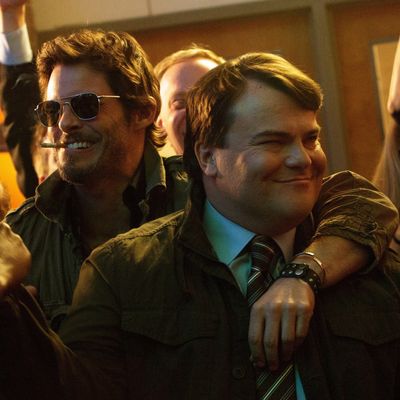
Names are important in The D Train. Calling various members of his high-school graduating class to invite them to their 20th reunion, Jack Black’s Dan Landsman introduces himself variously as “D-Money,” “D-Man,” and assorted other Ds. Very few people seem to remember him, and those who do, not too fondly. But they all remember Oliver Lawless (James Marsden), the hunky sports hero and drama student who went off to Los Angeles to become an actor. And while nobody’s particularly interested in coming to reunion when “D-Dog” invites them, they’re definitely interested when they hear Oliver Lawless might show.
So, here’s a funny thing, and a weird bit of disclosure: I went to high school with Oliver Lawless. Or rather, I went to high school with an Oliver Lawless, and with this film’s co-writer and co-director, Andrew Mogel. They were both a year behind me and I didn’t know them particularly well. I have no idea what the real Oliver Lawless is doing today, but I’m pretty sure he didn’t go off to become an actor. Mogel has borrowed his name, not his persona — because everybody thought Oliver Lawless had the coolest fucking name.
Dan is a guy who never quite left high school mentally. He married a girl from high school, he still lives in the same town, he didn’t even try to go away for college. And he still carries the scars of those years with him; he can’t even be happy when he learns that a girl at school might be interested in his son because he assumes that the boy is about to be pranked and humiliated. Then one night, seeing a Banana Boat sunscreen commercial that Lawless (shirtless, stacked, perfect) has done, the desperate-to-be-liked Dan has the bright idea of scoring the school hero for the reunion. If he manages to, the event will be a success — but more important, Dan himself will, for once, be a success in the eyes of his former classmates. So he concocts an elaborate work excuse to travel out to Los Angeles, where he can reconnect with Lawless. Tagging along with him is his desperate, cluelessly sincere boss (a wonderful Jeffrey Tambor), who is convinced that they’re about to land a big account.
Lawless, for his part, is the opposite of Dan: He went far, far away after high school, he barely thinks about those years anymore, and he’s fundamentally rootless. He plays along with Dan’s conception of him as some sort of god, when the truth is that he’s a struggling actor in his late 30s whose job prospects are rapidly dwindling. (Spotting Dermot Mulroney at a club, Lawless pretends to know him and awkwardly approaches the actor, just to impress Dan.) Over a couple of rowdy nights in L.A., these two high-school acquaintances get to know each other over shots, pills, and cocaine.
And then …
(Okay, here’s the part where I have to put in a stupid spoiler warning, even though what I’m about to discuss happens in the first 35 minutes of the film.)
And then they fuck.
Their drunken tryst doesn’t actually change things much. Lawless, for whom sex (with both men and women) is random, anonymous, and frequent, agrees to come to the reunion and fist-bumps Dan good-bye. Dan heads back home to his wife and kids, and to a genuinely appreciative and admiring reunion committee. When people find out Lawless is coming, the RSVPs start to roll in. Dan, it appears, is not the only one who was in awe of this demigod. Even his wife (played by the great Kathryn Hahn) is excited.
Dan is proud, conflicted, embarrassed, and jealous — but of whom or what exactly, he can’t quite say. And this is where the movie gets really interesting. We’ve seen countless reunion comedies before, and we’ve seen countless Oliver Lawlesses and Dan Landsmans: the stud who peaked in high school, and the nebbish who never quite peaked, at least socially. The D Train takes this premise and at first builds what seems like a standard-issue cringe comedy around it, using Jack Black’s alpha-delusional shtick to terrific, albeit predictable, effect.
But then the movie turns the cringe level up, way up — so far up that it comes out the other end and becomes, essentially, a drama. Dan, who always overreacts to everything, doesn’t quite know what to do when Lawless actually comes for the reunion. Meanwhile, Lawless has his own problems; Marsden nails the mannerisms of this drifting, devil-may-care loser. Dan’s obsessive need to overinterpret and suspect everything eventually starts to get the best of him — but so, too, does Lawless’s inability to give a shit about anything. As we watch these two contrasts bounce off each other, the last act of The D Train becomes a hilarious, deeply weird, and ultimately touching medley of delusion, humiliation, and friendship.


